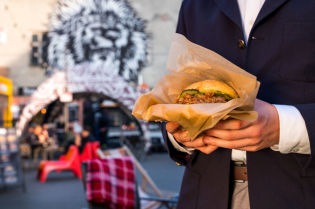Culinary heritage and tourism – an encounter with Mariusz Rybak
The Interreg SlowFood Central Europe project has entered another stage. A representative of Slow Food talked to a group of people dealing with the promotion of culinary culture in Krakow about Slow Food activities aimed at preserving culinary traditions.
The participants discussed how our cultural identity is shaped in respect to food. Some of our habits come from the region we grew up in, some from our family and their background. Unfortunately, knowledge is often not passed down from parents and grandparents to children. – The cultural process of handing down recipes, methods, and culinary practices is slowly disappearing – noted Mariusz Rybak who was conducting the workshop. The participants talked about their childhood memories related to food, longings for products that are no longer readily available and commented on the sub-standard gastronomic fare available in shops.
The objective of the Interreg Central Europe SlowFood CE project is to create a new model of tourism that will educate incoming travellers about local culinary heritage and promote the values proclaimed by Slow Food, including sustainable food choices. – Krakow is not recognised by tourists as a city that is worth visiting because of its culinary culture. Food is usually mentioned in relation to its low price – commented Bartosz Wilczyński.
Participants of the workshop deliberated on what could be the focus of this new approach to gastronomy in Krakow – the strict use of certified products or a shorter supply chain and building trust with suppliers and restaurateurs. – Certification does not guarantee quality. I do not use certified meat, but my meat has to be of excellent quality so I can prepare it the way I want: by dry ageing – Adam Chrząstowski explained the reality of working as a restaurateur and chef.
When asked how consumers can make informed choices about where to eat and shop for food, Mariusz Rybak pointed out Slow Food projects such as the Ark of Taste and Chefs' Alliance. – Our decisions should be based on trusting the grower, breeder or chef. It is not always possible to meet these people and learn about their work personally, that is why we need to rely on recommendations from others. Taking part in projects like ours helps us to make informed choices – said Rybak.
– Slow Food strives to make valuable products more accessible, but also inspire change and encourage the comeback of traditional production methods – said Mariusz Rybak and gave an example of an Austrian annual bread festival. Due to the immense popularity of the event, the products offered at the stalls were no longer made the traditional way. The members of local Slow Food helped to train local producers and revived traditional production methods in the region. – The training sessions were led by young bakers working in somewhat hipster places. But it is often them that nurture baking traditions – remarked Rybak. Mariusz Rybak talked also about the Slow Food Travel project illustrated by an example of the culinary trail in Carinthia where tourists can visit local food producers in the region.










